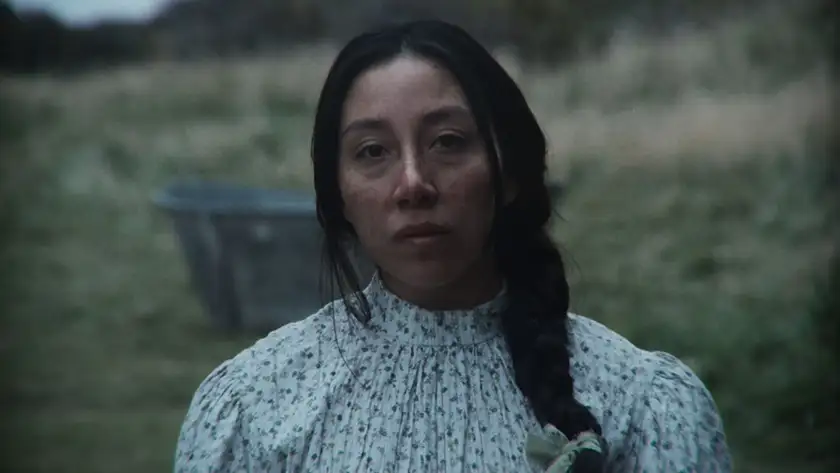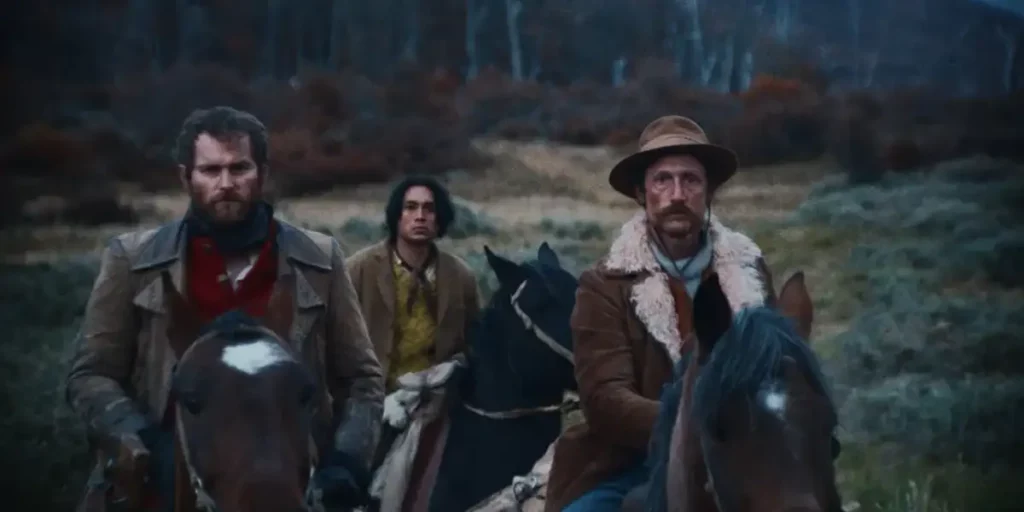With The Settlers (Los Colonos), Felipe Gálvez offers a piercing and cold look at the brutal actions in La Tierra del Fuego.
The Western genre is undergoing some kind of revision. Filmmakers from across the world – such as Warwick Thornton, Zacharias Kunuk, and even Kelly Reichardt – are looking at it through a new modern lens, one that is centered on untold stories about the darker side of the frontier and dry plains. It is pretty fascinating how these films have been turning out. You can easily see the influence of the auteurs who made the genre so popular and rich, yet with a sensation that feels like a breath of fresh air. The most recent one to join the group is Felipe Gálvez with his feature-length debut, The Settlers (Los Colonos). It starts as a cold look at colonialism and genocide taking place in early 20th-century Chile and ends with a commentary on how crucial cinema is to shine a light on these sidelined harsh truths.
The Settlers begins in 1901, in a particular place in Chile named Tierra del Fuego (the land of fire, in English). The fire in the title of that location doesn’t refer to a literal one, but the desolation one feels when walking through those empty plains: it feels like a descent to hell. There are some occasional scenes with bright blue skies; yet, for the most part, we see ones that feature a darker haze, which covers the film with significant amounts of dread. The story can be described as easily as a group of three men who must transport some goods from point A to point B. However, the circumstances and situations that transpire during their travels are far more complicated and devastating.
We first see a group of overworked men putting up fences in the vast grasslands owned by their boss, José Menéndez (Alfredo Castro), known as “the god of white gold” – a name that Gálvez puts in bold letters across the screen. These types of titles appear in the film on many occasions, when introducing a vital character or starting a new chapter (The King of White Gold; Half-Blood; The Ends of the Earth; The Red Pig) on this journey. Gálvez does this to give his debut another myth-like coating. It helps give more emphasis on the questions the Chilean filmmaker asks us as we watch. Myths are meant to answer timeless questions and be used as guides for each generation. In this case, Gálvez wants to show us that most of what we read about the past is sanitized to a great degree, trying to cover a darker history.
Even with a ninety-seven-minute runtime, The Settlers takes time to stage all these scenarios authentically while still playing with some Western genre conventions introduced by Sergio Leone in the Spaghetti Westerns and Anthony Mann in his classic renditions of the Wild West. The history books say that Menéndez was a businessman and owner of very large companies that stood tall for decades during the time. However, in this film, we are introduced to him differently, one that’s more reflective of his abusive power. Like many of his accomplices or fellow vendors, he wants his business to grow. These were fast-changing times; every decision these magnets made was tied with a movie towards modernization to increase their wealth. But there’s one specific transaction that Menéndez entrusts three men to do so he doesn’t get his hands dirty.

Menéndez hires a Scottish Lieutenant named Alexander MacLennan (Mark Stanley) to clear a path to the Atlantic Ocean and efficiently sell his “white gold”. The “white gold” in question refers to sheep, prize livestock that serves of great importance to the colonialist buyers. That’s why Lieutenant MacLennan has a big task ahead of him. But he isn’t going on this journey alone; MacLennan is joined by Bill (Benjamin Westfall), an American mercenary, and Segundo (Camilo Arancibia), a mestizo who Menéndez demanded to join the team. The three of them aren’t there to bond or connect with one another as happens in other Westerns set during troubling times. In The Settlers, they are only trying to survive at an age where genocide occurs in every corner of these hellscape plains.
MacLennan exudes his dominance over his other two companions, wearing a bright red coat that immediately pops from the screen. It symbolizes his nihilistic behavior – the blood that spills from his past and forthcoming actions. On the other hand, Bill is the archetype of a cowboy, similar to those you see in the films of John Ford and Sam Peckinpah. But what separates this character from the others is his overly barbarous nature. Like MacLennan, he also has a token that symbolizes his persona; in Bill’s case, it is a set of severed human ears stringed one on top of the other. Segundo is the most sympathetic by a mile wide of the three, but he is also involved in some of the crimes, sometimes against his will.
As the three of them traverse through the pastures of La Tierra del Fuego, they find themselves having their fair share of harrowing encounters with other settlers and villagers, all of which end violently. These scenes of conversation and psychological confrontations serve as a way for Gálvez to expand on the film’s themes the most. They reveal how morally indifferent these people who ransack the lands are. It will remind many of Martin Scorsese’s latest joint, Killers of the Flower Moon, another film about the tragedy of colonialism. Both stories are engrossing in their respective rights, using moments of brutality and violence to demonstrate to the audience the level of cruelty that occurred back then. Scorsese and Gálvez sometimes dwell on exploitation due to their raw and cold depictions of actual events. However, much to their favor, those scenes never reach a point where they become provocative, which might have caused the directors to miss the point thematically.
With filmmakers like Manuela Martelli, Sebastian Lelio, Pablo Larraín, and Maite Alberdi, Chile is rapidly on the rise to becoming a country with one of the most fascinating filmographies in recent memory. What separates Chilean cinema from the rest of the other current movements, like the ones in Argentina and Denmark, is that the work is based on the country’s past, no matter the subject matter or genre. And Felipe Gálvez’s debut is one of the best examples from the bunch. It is a history lesson in the most true-to-life way, showcasing the cruelty seeded in the lands thousands of people walk in daily.
The Settlers (Los Colonos) was released in theaters in the US, UK, and various countries in January-February 2024. The film will be available to stream on Mubi from March 29, 2024.

